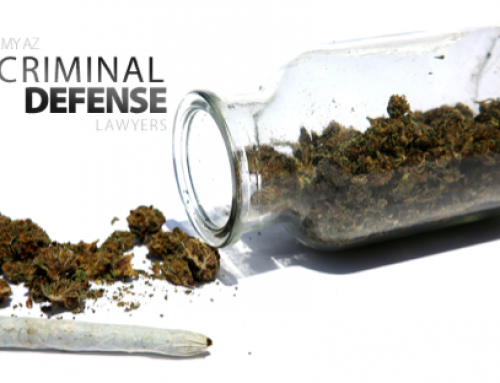Expungement of Marijuana Convictions in Arizona
While the presidential vote in Arizona hinged on razor-thin margins, Prop 207, which legalizes recreational marijuana in Arizona, was passed 60-40. This bill allows for adults aged 21 and up to purchase marijuana from licensed dispensaries, and to possess up to one ounce of marijuana at a time. While weed enthusiasts everywhere may see this as cause for celebration, this leaves those with prior marijuana convictions in Arizona wondering whether these charges can be expunged from their criminal records.

Possession Specifics
Prop 207 allows for the possession of one ounce of marijuana, which is approximately 28 grams. However, Prop 207 only allows for the possession of 5 grams of marijuana concentrates. It also allows Arizonans 21 and older to have up to 6 pot plants in their home. Households with two or more adults over 21 can have up to 12 plants. Those who are found to be in possession of more than one ounce but less than 2.5 ounces will be charged with a petty offense, which is punishable by a maximum $300 fine.
When Will Recreational Marijuana Legally Be Available for Purchase?
While Prop 207 has passed, it will still be at least a few months before recreational marijuana will be available for purchase at licensed dispensaries in Arizona. There will be a limited amount of recreational marijuana dispensary licenses available, and current medical marijuana dispensaries will have first priority when applying for these licenses. Medical marijuana dispensaries can begin applying in January 2021, and applications will take approximately 60 days to process. However, these dispensaries should be able to start selling to recreational customers quickly, as they are already equipped to sell to medical customers.
Previous Convictions for Marijuana in Arizona
More than 15,000 people in Arizona were arrested for marijuana possession in 2018. There are more than 100 people currently serving time in Arizona for marijuana possession. So what does Prop 207 mean for these people? Thankfully, Prop 207 allows for the expungement of many marijuana-related charges. It also means that all pending marijuana charges will be dismissed. There are approximately 6,000 pending criminal cases in Maricopa County that involve marijuana charges. However, Prop 207 will not allow for the dismissal of concurrent charges stemming from marijuana arrests, like robbery, DUI, or possession of other illegal substances.
Anyone convicted of a marijuana-related charge will be able to apply for expungement due to Prop 207. The burden will be on the state to prove that the applicant is not entitled to an expungement. If the prosecutor’s office doesn’t challenge the expungement within 30 days of the petition being filed, the conviction will be expunged.
What is Expungement?
Marijuana possession could previously be charged felony in Arizona, although those charges are often reduced to misdemeanors. Both types of charges remain on the defendant’s criminal record for life, making it harder to get a job, find a job, obtain professional licensure, be approved for residential rental applications, and more. In expungement, criminal conviction is sealed from the defendant’s record, essentially meaning it is erased. Some charges can be set aside in Arizona, but these charges will still show up on background checks, with the specification that the conviction has been set aside. An expunged conviction should not show up on a background check at all.
Maricopa County Attorney
There were more political races than just Trump vs. Biden and Kelly vs. McSally in the 2020 election. Julie Gunnigle (Democrat) and Allister Adel (Republican, incumbent) both ran for Maricopa County Attorney, with their positions on Prop 207 being part of their campaigns.
As part of her campaign, Gunnigle vowed that all cases involving personal-use amounts of marijuana would be dismissed, and prosecutors would be instructed to file no objections to expungement requests for these charges. She also promised to not prosecute low-level marijuana cases, regardless of if Prop 207 passed. While Adel merely promised to follow the letter of the law, her position is that low-level offenders should receive treatment for their substance addiction issues rather than jail time. Adel previously implemented programs that allowed low-level marijuana offenders to have their charges dismissed if they completed a drug diversion program or obtained a medical marijuana card. However, this solution has drawn criticism as medical marijuana prescriptions can cost up to a few hundred dollars in Arizona, making cost the deciding factor between being a criminal and a medical patient. Adel has since been declared the winner of the race for Maricopa County Attorney. She has stated that she will only allow for expungements for crimes involving less than 2.5 ounces of marijuana.
What’s Next When it comes to expungement of marijuana convictions
Those with previous marijuana convictions can begin applying for expungement on July 21, 2021. The expungement process may be slightly less automatic because Adel defeated Gunnigle in the race for Maricopa county attorney, but prosecutors will still have a maximum of 30 days to object to expungement. Prosecutors in Arizona counties besides Maricopa may follow stricter rules than those Adel plans to use, and only allow for expungement in cases involving one ounce or less of marijuana. There may be as many as 200,000 people in Arizona who are eligible for expungement now that Prop 207 has passed.
Just because recreational marijuana has been legalized, doesn’t mean that you can’t be arrested in relation to its use. You can be arrested for driving under the influence of marijuana, a charge that comes with mandatory jail time. Possession of more marijuana than allowed by Prop 207 is a petty offense. Employers may also continue to terminate or choose not to hire someone who tests positive for marijuana.
Larger Implications
The legalization of marijuana, both medical and recreational, has gained increasing support over the years. This is evidenced by Prop 207 passing by a clear majority in a historically red state. Supporters of Prop 27 maintain that people of color are disproportionately affected by strict marijuana laws. African American Arizonans are three times more likely than a white Arizonan to be arrested for marijuana possession, despite these two groups using marijuana at nearly equal rates. These discrepancies are even more dramatic in other areas across the country. African American and Hispanic Arizonans statistically receive higher sentences than white Arizonans. Because of the serious implications a marijuana conviction can have on future opportunities, this results in long term negative economic impact on these communities. Besides the negative consequences a conviction and jail time can have on career opportunities, a marijuana conviction can jeopardize an individual’s right to vote, own a firearm, and receive public assistance.
Back in July 2020, as part of his presidential campaign, Joe Biden proposed federal aid to states that provide an automatic expungement process for low-level marijuana convictions. Despite opposing the legalization of cannabis, Biden has stated that it hurts everyone when nonviolent, low-level marijuana offenders contribute less to society because of harsh marijuana punishments. While states like California already have procedures for automatic marijuana expungement, many states simply don’t have the knowledge or capacity to set up such a system. Federal funding would go to helping states set up automatic record sealing and expungement processes. While Adel didn’t campaign with a promise of automatic expungement like Gunnigle did, it is unclear whether she will implement these procedures once federal funding programs are available.

My AZ Criminal Defense Lawyer
Mesa Location:
1731 West Baseline Rd., Suite #100
Mesa, AZ 85202
Office: (480) 448-9800
Glendale Location:
20325 N 51st Avenue Suite #134, Building 5
Glendale, AZ 85308
Office: (602) 509-0955
Tucson Location:
2 East Congress St., Suite #900-6A
Tucson, AZ 85701
Office: (520) 441-1450
Avondale Location:
12725 W. Indian School Rd., Ste E, #101
Avondale, AZ 85392
Office: (623) 499-4222




